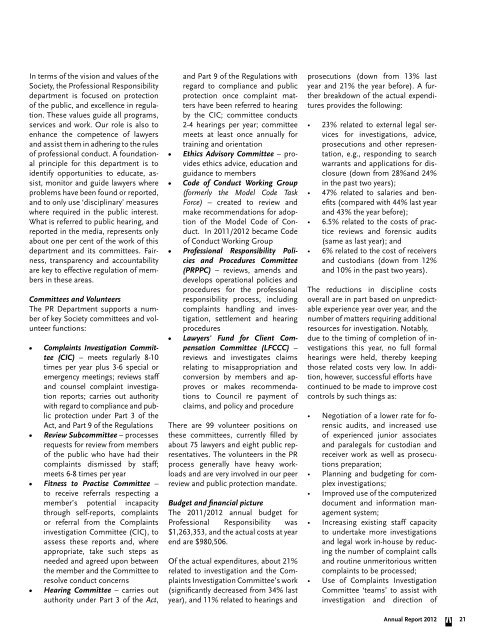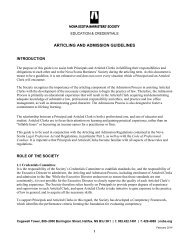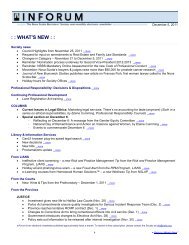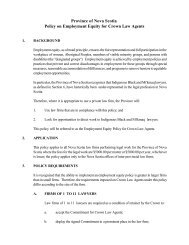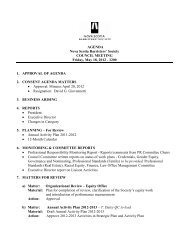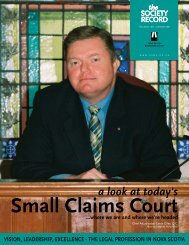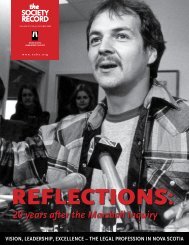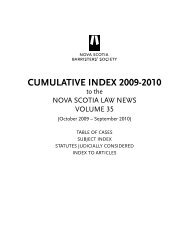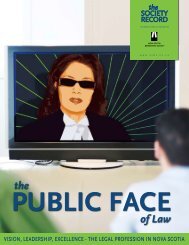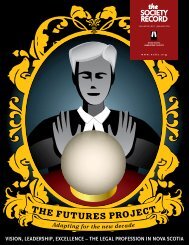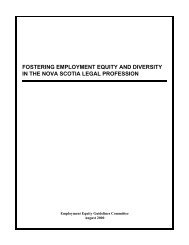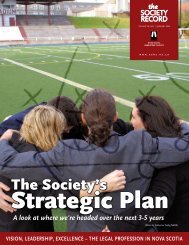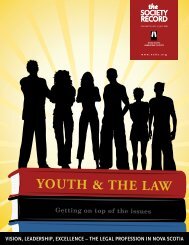2012 NSBS Annual Report - Nova Scotia Barristers' Society
2012 NSBS Annual Report - Nova Scotia Barristers' Society
2012 NSBS Annual Report - Nova Scotia Barristers' Society
Create successful ePaper yourself
Turn your PDF publications into a flip-book with our unique Google optimized e-Paper software.
In terms of the vision and values of the<br />
<strong>Society</strong>, the Professional Responsibility<br />
department is focused on protection<br />
of the public, and excellence in regulation.<br />
These values guide all programs,<br />
services and work. Our role is also to<br />
enhance the competence of lawyers<br />
and assist them in adhering to the rules<br />
of professional conduct. A foundational<br />
principle for this department is to<br />
identify opportunities to educate, assist,<br />
monitor and guide lawyers where<br />
problems have been found or reported,<br />
and to only use ‘disciplinary’ measures<br />
where required in the public interest.<br />
What is referred to public hearing, and<br />
reported in the media, represents only<br />
about one per cent of the work of this<br />
department and its committees. Fairness,<br />
transparency and accountability<br />
are key to effective regulation of members<br />
in these areas.<br />
Committees and Volunteers<br />
The PR Department supports a number<br />
of key <strong>Society</strong> committees and volunteer<br />
functions:<br />
• Complaints Investigation Committee<br />
(CIC) – meets regularly 8-10<br />
times per year plus 3-6 special or<br />
emergency meetings; reviews staff<br />
and counsel complaint investigation<br />
reports; carries out authority<br />
with regard to compliance and public<br />
protection under Part 3 of the<br />
Act, and Part 9 of the Regulations<br />
• Review Subcommittee – processes<br />
requests for review from members<br />
of the public who have had their<br />
complaints dismissed by staff;<br />
meets 6-8 times per year<br />
• Fitness to Practise Committee –<br />
to receive referrals respecting a<br />
member’s potential incapacity<br />
through self-reports, complaints<br />
or referral from the Complaints<br />
investigation Committee (CIC), to<br />
assess these reports and, where<br />
appropriate, take such steps as<br />
needed and agreed upon between<br />
the member and the Committee to<br />
resolve conduct concerns<br />
• Hearing Committee – carries out<br />
authority under Part 3 of the Act,<br />
and Part 9 of the Regulations with<br />
regard to compliance and public<br />
protection once complaint matters<br />
have been referred to hearing<br />
by the CIC; committee conducts<br />
2-4 hearings per year; committee<br />
meets at least once annually for<br />
training and orientation<br />
• Ethics Advisory Committee – provides<br />
ethics advice, education and<br />
guidance to members<br />
• Code of Conduct Working Group<br />
(formerly the Model Code Task<br />
Force) – created to review and<br />
make recommendations for adoption<br />
of the Model Code of Conduct.<br />
In 2011/<strong>2012</strong> became Code<br />
of Conduct Working Group<br />
• Professional Responsibility Policies<br />
and Procedures Committee<br />
(PRPPC) – reviews, amends and<br />
develops operational policies and<br />
procedures for the professional<br />
responsibility process, including<br />
complaints handling and investigation,<br />
settlement and hearing<br />
procedures<br />
• Lawyers’ Fund for Client Compensation<br />
Committee (LFCCC) –<br />
reviews and investigates claims<br />
relating to misappropriation and<br />
conversion by members and approves<br />
or makes recommendations<br />
to Council re payment of<br />
claims, and policy and procedure<br />
There are 99 volunteer positions on<br />
these committees, currently filled by<br />
about 75 lawyers and eight public representatives.<br />
The volunteers in the PR<br />
process generally have heavy workloads<br />
and are very involved in our peer<br />
review and public protection mandate.<br />
Budget and financial picture<br />
The 2011/<strong>2012</strong> annual budget for<br />
Professional Responsibility was<br />
$1,263,353, and the actual costs at year<br />
end are $980,506.<br />
Of the actual expenditures, about 21%<br />
related to investigation and the Complaints<br />
Investigation Committee’s work<br />
(significantly decreased from 34% last<br />
year), and 11% related to hearings and<br />
prosecutions (down from 13% last<br />
year and 21% the year before). A further<br />
breakdown of the actual expenditures<br />
provides the following:<br />
• 23% related to external legal services<br />
for investigations, advice,<br />
prosecutions and other representation,<br />
e.g., responding to search<br />
warrants and applications for disclosure<br />
(down from 28%and 24%<br />
in the past two years);<br />
• 47% related to salaries and benefits<br />
(compared with 44% last year<br />
and 43% the year before);<br />
• 6.5% related to the costs of practice<br />
reviews and forensic audits<br />
(same as last year); and<br />
• 6% related to the cost of receivers<br />
and custodians (down from 12%<br />
and 10% in the past two years).<br />
The reductions in discipline costs<br />
overall are in part based on unpredictable<br />
experience year over year, and the<br />
number of matters requiring additional<br />
resources for investigation. Notably,<br />
due to the timing of completion of investigations<br />
this year, no full formal<br />
hearings were held, thereby keeping<br />
those related costs very low. In addition,<br />
however, successful efforts have<br />
continued to be made to improve cost<br />
controls by such things as:<br />
• Negotiation of a lower rate for forensic<br />
audits, and increased use<br />
of experienced junior associates<br />
and paralegals for custodian and<br />
receiver work as well as prosecutions<br />
preparation;<br />
• Planning and budgeting for complex<br />
investigations;<br />
• Improved use of the computerized<br />
document and information management<br />
system;<br />
• Increasing existing staff capacity<br />
to undertake more investigations<br />
and legal work in-house by reducing<br />
the number of complaint calls<br />
and routine unmeritorious written<br />
complaints to be processed;<br />
• Use of Complaints Investigation<br />
Committee ‘teams’ to assist with<br />
investigation and direction of<br />
<strong>Annual</strong> <strong>Report</strong> <strong>2012</strong> 21


